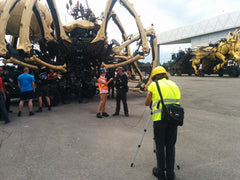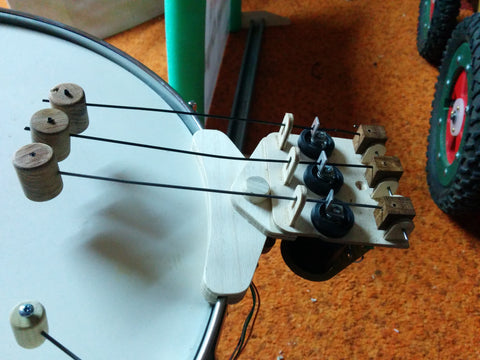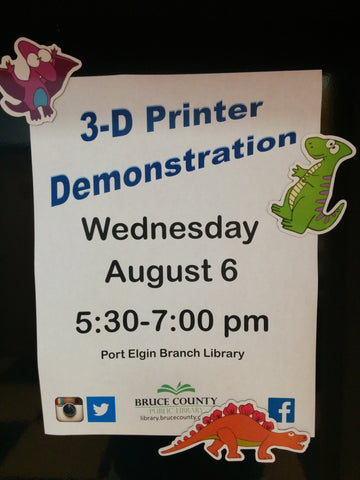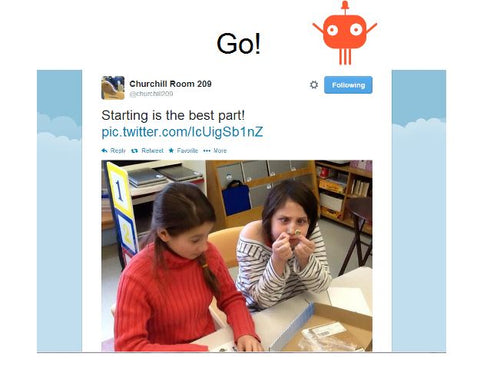- Continue Shopping
- Your Cart is Empty
Behind the Scenes with La Machine
On Sunday the 23rd, Maker Junior visited the Space and Aviation museum where La Machine set up their massive animatronic puppets to roam the streets. Join us as we get a behind the scenes tour to learn more about these fantastic machines.

Meet Ottawa Maker, Alan Rushforth
Earlier this year I was introduced to an Ottawa maker, Alan Rushforth. Alan is a retired Aeronautical Engineer and a prolific maker! If you've ever ridden the snowmobile simulator at the Canadian Museum of Science and Technology, you are familiar with his work.

New! Two March Break Day Camps
I am very excited about our two days of March Break day camp at Maker Space North next month.
On Monday, March 16 we have Making Mods. A mod, or modification, turns something ordinary into something extraordinary. Join us to work with artist Petr Maur to mod your own ray gun. We’ll learn the basics from Petr and also get a chance to work on our own creations from parts and pieces and found objects. Registration for Making Mods on Eventbrite.

On Tuesday, March 17, we have Animatronics. Animatronics bring lifelike characteristics and movement to an otherwise inanimate object. Join us to work with local maker, Alan Rushforth, to learn the basics. Then we'll start work on our own creations. Have you ever wanted a pet dinosaur? Registration for Animatronics on Eventbrite.
Discounts for siblings and multiple day registrations. Use "Contact the Organizer" on Eventbrite for the coupon code.
Toronto Mini Maker Faire 2014: Hitchbot Jr meets Hitchbot
 One of the things we were really excited about doing at the Toronto Mini Maker Faire was meeting Hitchbot. If you haven't met HitchbotJr yet, he's a project of EPCOTclass at Churchill Alternative public school. They were inspired by Hitchbot's travels across Canada. He's got a GPS running watch in his backpack.
View full article →
One of the things we were really excited about doing at the Toronto Mini Maker Faire was meeting Hitchbot. If you haven't met HitchbotJr yet, he's a project of EPCOTclass at Churchill Alternative public school. They were inspired by Hitchbot's travels across Canada. He's got a GPS running watch in his backpack.
View full article →
Toronto Mini Maker Faire, November 22-23
We are excited to announce that will be exhibiting at the Toronto Mini Maker Faire, November 22-23, at the Toronto Reference Library at Yonge & Bloor. Tickets are free! Come see what all the excitement is about.
View full article →Fall 2014 Workshops and Events
Fall 2014
Imagine Eddy, September 20, 10 AM - 5PM
Join us for Imagine EDDY at the Espace bidouilleurs et << Makers >>. We'll have tables set up with some of projects and kits, and we'll be building Doodlebots too! imagineeddy.ca

GNAG Inventors Workshop, September 22 - Dec 15
We're running two afterschool Inventor's Workshops this fall through the Glebe Neighbourhood Activities Group. Mondays for 6-8 yrs old, and Wednesdays for 9-12yrs old. In this fun class we learn how to keep and inventor's log book to write down our ideas as work towards creating our own inventions. Registration starts September 5.

New! ABC Ottawa Take-off, October 25
This fall we have a 5 week Maker Workshop through the Association for Bright Children's Take-off program on Saturday mornings. We'll be working a series of five projects exploring conductivity and simple circuits. Registration night is October 2, 7:30pm, at the Ron Kolbus Lakeside Centre.

What we did for summer vacation
Eureka!
It was back to school here yesterday. The boys were nervous and excited to head back to class. We've had a great summer. It has been a whirlwind of activity as we've vacationed, visited and "workshop-ed" our way around the province. I mentioned the Eureka! summer reading program in a few previous posts here and here, but today I got to sit down and take a look at what we did.

- This was on the sidewalk leading up to the Lucknow library. Thanks for the welcome!
We were thrilled to be able to take our summer workshops to an astonishing 22 libraries. We worked with 280 + kids to help them successfully create their projects and teach them something new.

- Sign for our workshop in Port Elgin.
Some of the areas we visited were very rural. In Chesley, I was surprised to be parking across from a horse-drawn carriage outside the library. So many of the libraries we visited were curious about the maker movement and trying hard to bring new technology to their area. As we walked down empty main streets to the local library branch, it was easy to see what a vital role the library plays in bringing new resources into small towns. These tools that are associated with the maker movement have such potential. And the library can be instrumental in providing access to them.
3D Printing
We were very excited when Young Maker lent us a 3D printer to take with us on our tour. Most of the people we talked to had heard of 3D printing but have not had an opportunity to see one in action. It was lots of fun to demo. Nanik, in particular, has been very curious about the technology and dove right into it. More on that soon.

- We were happy to introduce 3D printing to the crowd that showed up.
Sumo Doodles
One of the highlights of the summer for me was the Doodlebot workshop at the Kemptville Library. We had a full class of kids of various ages. It was a nice, bright, open space with lots of room to work. And we had a little extra time and lots of helpers. One helper for every 3 kids. That made it possible to conduct a completely open workshop - my favorite kind - with very little instruction and giving only requirements. I did show them how to attach the wires to the motor, but that's about it. I don't usually do this with the wide range of ages and distribution we had that day. But because we had so many excellent helpers, we were able to provide guidance and watch for frustration. With incredible success! The room was large enough that we were able to have a couple of tables of sumo doodles off to the side for the kids who finished first. I think it's fair to say we all had a wonderful time.

- Sumo doodle!
My favorite new book
Speaking of watching for frustration, I need to tell you about my favorite new book. I opened almost every workshop this summer reading "The Most Magnificent Thing", by Ashley Spires.
The Most Magnificent Thing Book Trailer from Kids Can Press on Vimeo.
Reading the book at the start of a workshop gave the kids a chance to collect and focus. I love this book because it talks directly about the frustration you can feel when making. ( I can't confirm, but this book may have actually been written about me.) Even better, it gives a plan for dealing with it. I love the language. I totally get it when the little girl's hands "feel too BIG to work, and her brain is too full of all the not-right things." And the kids get it, too. I like this book because it gives me a chance to talk to the kids before they begin making about frustration. About recognizing frustration and about plans for dealing with it - like taking a deep breath, walking around the room, seeing what other kids are doing. It is also a chance to emphasize iteration and collaboration. How making is not about being first, but working together and sharing what we know. This book is a great way to open a workshop and start a conversation about making
Ottawa Mini Maker Faire
And of course, I can't talk about the summer without mentioning the Ottawa Mini Maker Faire. It was great to participate in our hometown event. We're already looking forward to next year. I've covered everything before, but hey, did I mention, we were on TV? Definitely a highlight for us!
Ottawa Mini Maker Faire 2014
 The Ottawa Mini Maker Faire was held August 16-17 at the Canadian Science and Technology Museum. This was the fourth annual faire and it gets bigger every year. Last year we were in a room inside the museum and a tent in the parking lot. This year we were completely inside the museum. There was the big room, like last year, and a new "Make it Space" back behind the locomotives. We were in the "Make it Space", geared to hands-on, interactive presentations. It was a busy couple of days! I'm going to stop trying to explain it all - here's a
TV clip
that did a great job, with our own Hari leading the way!
The Ottawa Mini Maker Faire was held August 16-17 at the Canadian Science and Technology Museum. This was the fourth annual faire and it gets bigger every year. Last year we were in a room inside the museum and a tent in the parking lot. This year we were completely inside the museum. There was the big room, like last year, and a new "Make it Space" back behind the locomotives. We were in the "Make it Space", geared to hands-on, interactive presentations. It was a busy couple of days! I'm going to stop trying to explain it all - here's a
TV clip
that did a great job, with our own Hari leading the way!
Bruce and Grey Counties: 8 Libraries, 5 Days
 The kids and I are just back from our whirlwind tour of Bruce and Grey counties last week. We managed to visit 8 libraries in just 5 days - Meaford, Port Elgin, Tara, Chesley, Lucknow, Teeswater, Walkerton and Owen Sound. We introduced kids to conductive paint, basic duct tape wearables, and vibration and movement with our doodling robots. Many thanks to
Young Maker
for lending us their 3D printer - we were excited to bring 3D printing demos in to some of these libraries as well.
The kids and I are just back from our whirlwind tour of Bruce and Grey counties last week. We managed to visit 8 libraries in just 5 days - Meaford, Port Elgin, Tara, Chesley, Lucknow, Teeswater, Walkerton and Owen Sound. We introduced kids to conductive paint, basic duct tape wearables, and vibration and movement with our doodling robots. Many thanks to
Young Maker
for lending us their 3D printer - we were excited to bring 3D printing demos in to some of these libraries as well.
Bringing Making Out of the Makerspace: Part III
* This is an excerpt from a presentation I made at Maker Faire, in San Mateo, on May 18 called "Bringing Making Out of the Makerspace". I'll be posting excerpts from that presentation this summer. I started with this post, Part I, and this post, Part II. *
Ready... Set
Once I'm in the classroom, the energy starts to rise. The kids know something different is about to happen and they are ready to go. But before we start making, there's some groundwork that has to happen. This is where we cover vocabulary – this helps with communication. Provide the theory. Demonstrate technique. Make sure they know what to do to start. Most importantly, give them the tools to troubleshoot. I use that word, "Troubleshooting", and depending on the project give a simple checklist. "If it doesn't light up – 1. have you tested the circuit? 2. is the polarity correct? 3. Are your connections good?" I also believe it's important to talk about frustration. All makers know about frustration. Not everything works the first time. Learning how to recognize and deal with frustration is an important skill. So talk about it. Talk about taking a deep breath, a walk around the classroom, and giving yourself another chance. I also talk about collaboration and sharing. How the goal is not to finish the project first, but to all be successful. Then we break into smaller groups. This is key. Nobody should work alone, it's too easy for fear and frustration to build. And in smaller groups, nobody feels lost.

Go!
And finally, we're off. Hopefully, to a successful start. But not always. Beware the first 10minutes. This is where I take my deep breath as the chorus of "I don't know what to do's" and "Can you do this for me?" starts up around the classroom. But I push back, gently. I remind them what we've discussed. I demonstrate, repeatedly. If there is symmetry, I'll demonstrate one side, and tell the student to do the other. I most often answer a question with another question, or a "why don't you try that". I encourage exploration. And gradually, the room turns, and instead of "I need..." it's "come see". And that is when I gradually start exposing them to more. Maybe a tool they haven't seen before – wirestrippers are hugely fascinating. Maybe a type of circuit they could try on their next project – a parallel circuit means two LEDs and you can make a smiley face. Maybe sharing ideas between tables or of projects I've seen before. I talk about where to find the parts we're using, and what other things we can do with them. Because I want them to keep making. I want them to keep exploring.

That's a wrap!
And then we're done. Most classes end with some sort of wrap up. The teachers I work with call this consolidation. I love it. I love to hear what they've learnt. How they deal with frustration. Because we take these ideas and move on to the next classroom or the next library or the next workshop, and continue to encourage kids to keep learning, keep growing, and keep making.






